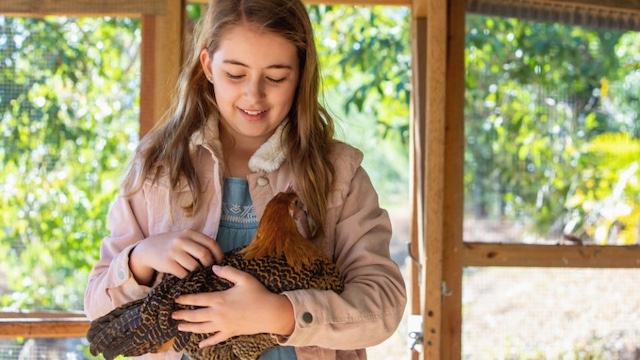As backyard chicken owners, we adore these cute, feathered creatures who not only provide us with a fresh supply of eggs but also offer an endless source of joy. But the question arises: where do chickens like to be petted?
Can we show them the same affection we share with our other pets, such as cats and dogs?
Let’s delve in to unravel this fascinating query and answer the question ‘where do chickens like to be petted?’.
The Big Question: Do Chickens Like to Be Petted?
It’s essential to understand that our feathery friends have different personalities and comfort levels.
Some breeds, such as the Orpington and Silkie, are renowned for being welcoming and craving human touch. Meanwhile, other breeds might be skittish and not as keen on physical contact.
However, one should never forget the power of building trust. Nurturing a strong bond with your flock can turn even the most cautious chicken into one that enjoys a friendly petting session.
Building Trust with Your Chickens
Forging trust with your chickens is not an overnight task. You have to continually provide them attention, starting from the day they hatch.
Young chickens start recognizing the human face as their ‘mother hen’, and offering them treats is a great way to win their hearts.
Case in point ‒ live mealworms are a personal favorite for many cluckers, making it an excellent treat to bond over.
Also, constantly spending time with your chicks, hand-feeding them and slow introductions to being held can help them become accustomed to you.
Top Tip: If you have pullets (juvenile hens), getting on their level helps appear less threatening, which can go a long way in establishing trust.
Petting Your Chickens: The Preferred Touch
Once you have built that trust, it’s time to understand where chickens like to be petted. The favorite spots usually include their backs, breast area, and the back of the neck.
It’s important to note that these are generalized areas, and some chickens may happily accept attention anywhere. Again, it’s all about recognizing individual preferences.
The petting technique also matters: a gentle stroke from the neck to the tail with a flat hand can do wonders. You may also scratch them gently on the neck and chest. But remember, we are not talking about scratching them vigorously like you would a dog. A gentle parting of the feathers, followed by a tender rub, is key.
Holding Your Chickens: The Right Way
When handling larger birds, being cautious is paramount. Approaching your chicken slowly, grabbing the chicken with your palms against the wings, wrapping your fingers around the belly, and cradling them against your chest sets an effective holding position. It minimizes the chance of injury and reduces anxiety in your feathery friends.
The Benefits of Petting Your Chickens
Beyond the satisfaction of bonding with your flock, there are several benefits to petting your chickens. For starters, getting an opportunity to touch and pet your chickens can be deeply relaxing and stress-relieving, not only for them but for you as well.
Moreover, a relaxed, well-cared-for chicken tends to lay more eggs. Thus, frequent petting sessions can lead to a boost in egg production. It also allows for regular health checks, promptly detecting potential health issues such as an egg-bound chicken or bumblefoot.
Best Breeds for Pets
While most chickens appreciate a gentle stroke, certain breeds are notable for their docility and affectionate nature. Breeds such as the Orpington, Silkie, and Rhode Island Red are widely known for their willingness to be hugged and cuddled.
Where Do Chickens Like to Be Petted? Now You Know!
So, where do chickens like to be petted? In reality, building trust and understanding your feathered friend’s personal preferences are crucial.
Once trust is established, you can appreciate a uniquely enriching relationship with your backyard chickens.
Be gentle, be patient, and give your chickens the affection that they deserve. After all, nothing says ‘I love you’ to a chicken better than a warm & gentle pet.
Read Next: What to Feed Chicks: A Brief Guide for Beginning Chicken Keepers

